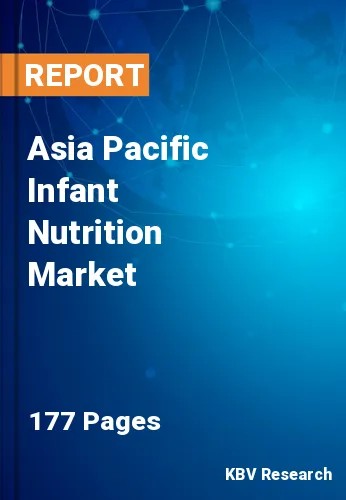The Asia Pacific Infant Nutrition Market would witness market growth of 9.5% CAGR during the forecast period (2023-2030). In the year 2021, the Asia Pacific market's volume surged to 587.9 Kilo Tonnes, showcasing a growth of 7.7% (2019-2022).
Major market companies can persist in the customer-centric market due to consistent innovation in product features and performance and consistent strategies such as customized packaging that reflects the nutritional components of infant food products. Additionally, attractive and functional packaging is a top priority for leading manufacturers. Baby food should be packaged in tamper-resistant containers to ensure the utmost level of food safety. In addition, social and environmental issues are now expected nationwide; as a result, businesses must adopt green standards for product development, packaging, and other value chain components, which can help these companies increase their market share in the market.
However, for six months after birth, infants must be breastfed because it provides virtually all of the nutrients necessary for their overall development. Several organizations, including the WHO, the Canadian Public Health Agency, and UNICEF, have increased women's awareness of lactation and its benefits. The initiatives of these non-profit organizations, which promote lactation among lactating women, could inhibit market demand for infant nutrition. In an ongoing effort to quantify the nutritional and functional attributes of human milk in newborn products, infant formula manufacturers have evaluated a variety of substances. Consequently, the number of infant formulas containing added prebiotics and probiotics has gradually increased. The FDA has granted GRAS (generally recognized as safe) status to prebiotics and probiotics, which are now added to commercial infant formulas. Manufacturers may view this as an opportunity to increase their product sales.
The Asia Pacific region is home to a large and rapidly growing population, including many infants and young children. This demographic trend provides a substantial consumer base for infant nutrition products. As economies in the Asia Pacific region rise, disposable incomes are rising among middle-class families. This has increased purchasing power and the ability to afford premium infant nutrition products. Rapid urbanization in many Asian countries has led to lifestyle and dietary habits changes. Urban families often seek convenient and packaged infant nutrition solutions, including formula and baby foods.
The China market dominated the Asia Pacific Infant Nutrition Market by Country in 2022, and would continue to be a dominant market till 2030; thereby, achieving a market value of $10,195.8 million by 2030. The Japan market is showcasing a CAGR of 8.7% during (2023 - 2030). Additionally, The India market would register a CAGR of 10.1% during (2023 - 2030).
Based on Form, the market is segmented into Solid, and Liquid. Based on Distribution Channel, the market is segmented into Offline channel (Hypermarkets/Supermarkets, Convenience Stores, Pharmacy, and Others), and E-Commerce. Based on Product Type, the market is segmented into Infant Milk, Follow-on Milk, Dried Baby Food, Prepared Baby Food, and Specialty Baby Milk. Based on countries, the market is segmented into China, Japan, India, South Korea, Singapore, Malaysia, and Rest of Asia Pacific.
Free Valuable Insights: The Global Infant Nutrition Market is Predict to reach $89.7 Billion by 2030, at a CAGR of 9.2%
The market research report covers the analysis of key stake holders of the market. Key companies profiled in the report include Reckitt Benckiser Group PLC, Perrigo Company PLC, Nestle S.A, Danone, S.A., Abbott Laboratories, The Kraft Heinz Company, Amul (The Gujarat Co-operative Milk Marketing Federation Ltd.), Arla Foods, Inc., DANA Dairy Group Ltd. and Sun-Maid Growers of California.
By Form (Volume, Kilo Tonnes, USD Billion/Million, 2019-2030)
By Distribution Channel (Volume, Kilo Tonnes, USD Billion/Million, 2019-2030)
By Product Type (Volume, Kilo Tonnes, USD Billion/Million, 2019-2030)
By Country (Volume, Kilo Tonnes, USD Billion/Million, 2019-2030)
Our team of dedicated experts can provide you with attractive expansion opportunities for your business.

